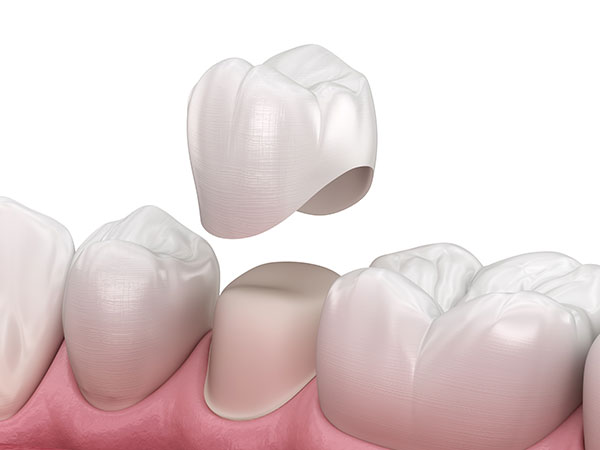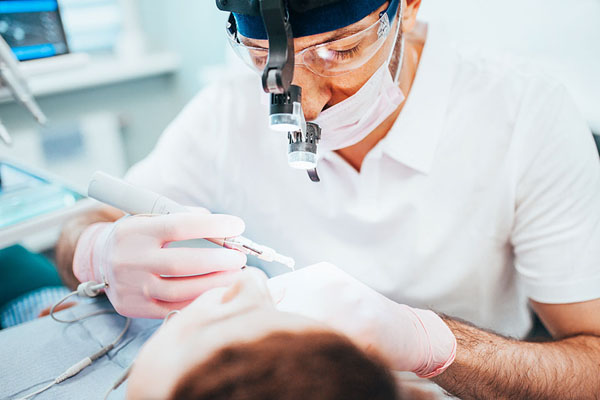Dental Crowns in Atlanta, GA
Dental Crowns Can Give You a Beautiful Smile
Dental crowns restore damaged or decayed teeth, helping countless patients achieve beautiful, healthy smiles. Crowns can be made from various materials and are custom-made to fit each patient’s unique needs.
At our Atlanta dental office, our cosmetic dentist offers dental crowns to meet your oral health needs. Learn more about dental crowns and discover if this solution is the right fit for your smile by calling (404) 524-1981! We also proudly serve patients coming from Decatur, Brookhaven, Marietta, and the surrounding areas!
What Are Dental Crowns?
Dental crowns, also known as caps or tooth crowns, are prosthetic devices placed over damaged or decayed teeth to restore their function, shape, and appearance. They’re custom-made to fit over the entire tooth, from the gum line to the chewing surface, and are made of porcelain, ceramic, metal, or a combination of these materials.
A dental crown can also be used on top of a dental implant, to support a dental bridge, or act as a cosmetic solution to improve the appearance of teeth.
When Is a Dental Crown Necessary?
There are multiple dental issues that a crown can fix. Our Atlanta dentist may recommend a dental crown for various reasons, including:
- Protecting a Weak Tooth: If a tooth has been weakened by decay, a large filling, or a root canal, a dental crown can provide additional support and prevent the tooth from breaking.
- Restoring a Broken or Damaged Tooth: A dental crown can be used to restore a tooth that has been broken, cracked, or severely worn down.
- Covering a Dental Implant: After a dental implant is placed, a dental crown is often used to cover the implant and create a natural-looking tooth replacement.
- Supporting a Dental Bridge: A crown can support a dental bridge, which is used to replace missing teeth.
- Improving the Appearance of a Tooth: Dental crowns can be used as a cosmetic solution to improve the appearance of misshapen, discolored, or poorly spaced teeth.
Signs You Need Dental Crowns
Some signs that you may need a dental crown include:
- Tooth pain or sensitivity
- A cracked or chipped tooth
- A large filling that needs to be replaced
- A tooth that has had a root canal
- A tooth that’s misshapen or discolored
Benefits of Dental Crowns
Some of the benefits of dental crowns include:
- Protection: They can help protect weak or damaged teeth from further damage or decay.
- Restoration: Dental crowns can restore the function and appearance of damaged teeth.
- Durability: Crowns are strong and durable, and can last for many years with proper care.
- Versatility: Dental crowns can be used for a variety of dental problems, from restoring a broken tooth to covering a dental implant.
- Aesthetics: Crowns can be made to match the color and shape of your natural teeth, creating a natural-looking and aesthetically pleasing result.
If you’re wondering how dental crowns may benefit you, contact our Atlanta dentist today to schedule your next appointment!
Types of Dental Crowns
There are various types of dental crowns, ensuring that each patient receives the solution they need to restore their smile. Our Atlanta dentist will go through your options and recommend the best choice for your dental health.
Porcelain Crowns
Porcelain crowns are made of a tooth-colored material that can be matched to the shade of your natural teeth, making them a popular choice for front teeth. They’re biocompatible and produce a natural, lifelike appearance. All porcelain crowns are a popular choice for their natural look and metal-free composition, but they may be more susceptible to chipping compared to other types of crowns.
Metal Crowns
Metal crowns are made of gold, nickel, or other metal alloys. They’re extremely durable and can withstand heavy biting forces and last a long time. However, their metallic color makes them less popular for front teeth.
Porcelain-fused-to-Metal Crowns (PFM)
PFM crowns are made by fusing a metal base with a porcelain coating, providing the strength of the metal and the aesthetics of the porcelain. They can be used for both front and back teeth.
Zirconia Crowns
Zirconia crowns are made of a durable, biocompatible material that is resistant to chipping and cracking. They can be matched to the color of your natural teeth and are an ideal option for back teeth.
Same-Day Crowns
Same-day crowns, also known as CEREC crowns, are a type of dental crown that can be fabricated and placed in a single dental visit. This is in contrast to traditional dental crowns, which typically require multiple appointments and the use of temporary crowns while waiting for the permanent crown to be fabricated in a dental lab.
The Dental Crown Procedure
Consultation and Planning
- Our dentist will examine the tooth to determine if it needs a crown or if there are other treatment options better suited for your oral health.
- X-rays might be taken to check the roots of the tooth and surrounding bone.
First Visit
- Preparation: The dentist will numb the tooth and surrounding gum tissue using a local anesthetic. The tooth is then reshaped along the chewing surface and sides to make room for the crown. The amount of tooth that needs to be removed will depend on the type of crown material.
- Impression: After reshaping, an impression of the tooth is created to ensure a proper fit and bite for the crown. This may be done traditionally using a mold or digitally with intraoral scanners.
- Temporary Crown: A temporary crown is placed to protect the prepared tooth while the permanent crown is created. It’s generally made from acrylic and is temporarily cemented in place.
Second Visit
- Permanent Crown Fitting: The temporary crown is removed. The dentist will place the new crown on the tooth to check its fit and color. If everything is acceptable, the tooth is cleaned and the new crown is permanently cemented in place.
- Adjustments: Bite adjustments might be made to ensure a proper fit. The dentist may ask you to bite down several times to verify the fit and adjust as necessary.
Aftercare and Follow-up
- It’s not uncommon to experience some sensitivity or mild discomfort after the procedure, especially after the anesthesia wears off. Over-the-counter pain relievers can be helpful.
- Aftercare is crucial for the longevity of your crown and your oral health. Proper brushing, flossing, and regular dental check-ups will ensure the longevity of your new crown.
- Avoiding hard foods and not using the crowned tooth as a tool (like opening packages) will help prolong the life of the crown.
Cost of Dental Crowns
The cost of dental crowns can vary widely based on several factors, including the type of crown, the material used, and the location of the dental practice. On average, the cost of a dental crown ranges from $800 to $1,500 or more per crown. More complex cases, such as those requiring a root canal or additional dental work, may incur higher costs.
Insurance coverage can significantly impact the out-of-pocket expense for a dental crown. Some insurance plans may cover a portion of the cost, while others may not cover it at all. It’s crucial to check with your insurance provider to understand the extent of your coverage.
In addition to the cost of the crown itself, there may be additional expenses associated with the dental crown procedure, such as:
- X-rays and Imaging: $50 to $200
- Anesthesia: $50 to $200
- Temporary Crown: $50 to $200
- Dental Lab Fees: $100 to $500
Discussing the cost of the dental crown procedure with your dentist will provide a clear understanding of the total cost and what is included. This transparency helps you plan financially and avoid any unexpected expenses.
Caring for Your Dental Crown
Proper care for your dental crown is essential to ensure its longevity and prevent complications. Here are some tips to help you maintain your dental crown:
- Brush Regularly: Brush your teeth at least twice a day with fluoride toothpaste and a soft-bristled toothbrush to keep your crown and surrounding teeth clean.
- Floss Daily: Flossing helps remove plaque and food particles from between your teeth and under your gumline, which is crucial for preventing tooth decay and gum disease.
- Avoid Hard Objects: Refrain from chewing on hard objects like ice or hard candy, as these can damage your crown.
- Prevent Grinding: If you grind or clench your teeth, consider using a mouthguard to protect your crown from excessive wear and tear.
- Regular Dental Visits: Schedule regular check-ups and cleanings with your dentist to ensure your crown remains in good condition and to address any potential issues early.
While dental crowns are durable, they are not indestructible. If you experience any issues with your crown, such as sensitivity or pain, contact your dentist immediately to address the problem and prevent further complications.
Common Issues with Dental Crowns
While dental crowns are a reliable solution for restoring damaged teeth, some common issues can arise. Here are some of the most frequent problems associated with dental crowns:
- Tooth Decay: Decay can occur under the crown, especially if it is not properly fitted or if good oral hygiene practices are not followed. Regular brushing and flossing are essential to prevent decay.
- Chipping or Breaking: Dental crowns can chip or break if subjected to excessive force or if not properly cared for. Avoid chewing on hard objects and consider using a mouthguard if you grind your teeth.
- Sensitivity: Some patients may experience sensitivity or pain after getting a dental crown, particularly if the crown is not properly fitted or if the tooth was not adequately prepared.
- Allergic Reactions: Although rare, some individuals may be allergic to the materials used in dental crowns, such as metal or porcelain. If you suspect an allergic reaction, contact your dentist immediately.
- Gum Disease: Poor oral hygiene can lead to gum disease around the crown. Regular dental check-ups and proper oral care are crucial to prevent this issue.
If you encounter any of these problems, it’s essential to contact your dentist promptly to address the issue and prevent further complications. Your dentist can provide solutions to ensure your dental crown remains functional and comfortable.
Frequently Asked Questions
How long do dental crowns last?
Generally, dental crowns can last anywhere from five to 15 years or even longer with proper care. The lifespan of your dental crown will depend on various factors such as the material used, oral hygiene routine, and the amount of wear and tear the crown is subjected to. Porcelain and ceramic crowns tend to have a longer lifespan than metal or resin-based crowns.
Is it painful to get a dental crown?
Getting a dental crown should not be painful as the procedure is usually performed with a local anesthetic. Some patients may experience some discomfort or sensitivity during or after the procedure. Your dentist can prescribe pain medication or recommend over-the-counter pain relievers to manage any discomfort.
How long does it take to put a dental crown on a tooth?
Generally, it takes two dental visits to complete the dental crown placement process. The total time it takes to place a dental crown on a tooth can vary depending on the specific case and the dentist’s technique. Your dentist will provide a treatment timeline at your initial consultation.
Can a dental crown be placed in one day?
Yes, it’s possible to get a dental crown placed in one day using a technology called CEREC (Chairside Economical Restoration of Esthetic Ceramics). This technology allows the dentist to create and place a custom crown in a single dental visit. The dentist will take digital impressions of the tooth, design the crown using computer-aided design (CAD) software, and then use an in-office milling machine to fabricate the final crown.
Discover if Dental Crowns Are Right for You
Dental crowns are a popular and effective way to restore damaged or decayed teeth. Contact our Atlanta dental office at (404) 524-1981 today to schedule a consultation with our dentist. They’ll evaluate your oral health and recommend the best treatment for you. We also proudly serve patients coming from Decatur, Brookhaven, Marietta, and the surrounding areas!


